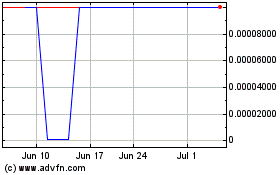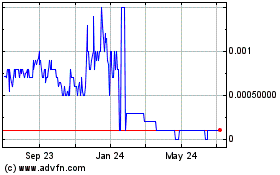Amarantus Enters Into Wolfram's Research Collaboration With Washington University School of Medicine
June 20 2014 - 9:27AM

Amarantus Bioscience Holdings, Inc., (OTCQB:AMBS), a biotechnology
company focused on the discovery and development of novel
diagnostics and therapeutics related to endoplasmic reticulum
stress, cell cycle dysregulation, neurodegeneration and apoptosis,
today announced that it has entered into a research collaboration
with the Washington University School of Medicine in St. Louis to
evaluate the efficacy of MANF to treat Wolfram-Syndrome-induced
blindness in animals. Dr. Fumihiko Urano, a researcher at the
Washington University School of Medicine, will be leading the
research. The project initially focuses on evaluating MANF
treatment efficacy in retinal cells that are produced from induced
pluripotent stem cells, which were derived from Wolfram's patients.
Dr. Urano has developed his models of retinal damage with funding
from the Jack and JT Snow Foundation.
"I am so pleased and thrilled that Amarantus has decided to team
up with the Jack and J.T. Snow Scientific Research Foundation to
help us on our quest for a cure for Wolfram Syndrome," commented JT
Snow of the Jack and JT Snow Foundation. "We are continuing to fund
Dr. Urano's work and are hopeful this nascent collaboration will
lead to a breakthrough for patients."
Wolfram's Syndrome is a rare, genetic pediatric condition
characterized by Type-1 diabetes, blindness due to optic atrophy,
deafness and neurodegeneration that affects an estimated 20,000
patients worldwide, including 1,000 in the United States. Wolfram's
is characterized by cellular degeneration due to stress of the
endoplasmic reticulum, a structure in cells where newly formed
proteins are folded into their functional shapes.
Wolfram's patients typically develop Type-1 diabetes in early
childhood due to beta cell degeneration. The Company believes that
Wolfram's-induced diabetes may serve as an orphan indication to
demonstrate proof of concept for a disease-modifying treatment for
diabetes. Recent data published in the scientific journal Cell
suggests that MANF is indispensable for beta cell protection and
proliferation.
"I am extremely pleased to begin formally collaborating with
Amarantus on this very promising area of research for Wolfram's
patients," said Dr. Urano, the Samuel E. Schechter Professor at the
Washington University School of Medicine. "Blindness is the most
devastating quality-of-life issue faced by patients, and there are
currently no treatments available for blindness due to Wolfram's.
MANF has demonstrated efficacy in protecting retinal cells from
damage in other models of blindness. We have demonstrated in the
lab that MANF protects against endoplasmic reticulum stress in beta
cells and are hopeful this mode of action will translate into
Wolfram's retinal cells. We believe multiple projects may emerge as
a result of this effort, including additional work on the diabetes
components of Wolfram's."
"We have a very strategic interest in Wolfram's Syndrome, as we
believe MANF could be a disease-modifying treatment for many
different aspects of Wolfram's disorder, including blindness and
Type-1 diabetes," said Gerald E. Commissiong, President & CEO
of Amarantus. "With only 1000 patients in the United States, we
believe efficacy in Wolfram's would lead to an accelerated path to
market for MANF. We are extremely pleased to be working with Dr.
Urano and with the Jack and JT Snow Foundation to support this
important area of research into Wolfram's."
About Mesencephalic-Astrocyte-derived Neurotrophic
Factor (MANF)
MANF (Mesencephalic-Astrocyte-derived Neurotrophic Factor) is
believed to have broad potential because it is a
naturally-occurring protein produced by the body for the purpose of
reducing and preventing apoptosis (cell death) in response to
injury or disease, via the unfolded protein response the
endoplasmic reticulum. By manufacturing MANF and administering it
to the body, Amarantus is seeking to use a regenerative medicine
approach to assist the body with higher quantities of MANF when
needed. Amarantus is the front-runner and primary holder of
intellectual property (IP) around MANF, and is initially focusing
on the development of MANF-based protein therapeutics. MANF's
current lead indication is Retinitis Pigmentosa, and other
applications including Parkinson's disease, and Wolfram's Syndrome.
Additional applications for MANF may include Traumatic Brain Injury
(TBI), myocardial infarction, antibiotic-induced ototoxicity and
certain other rare orphan diseases currently under evaluation.
About Amarantus BioScience Holdings, Inc.
Amarantus BioScience Holdings (AMBS) is a biotechnology company
developing treatments and diagnostics for diseases associated with
neurodegeneration and protein misfolding-related apoptosis. AMBS
has licensed Eltoprazine ("Eltoprazine"), a phase 2b ready
indication for Parkinson's Levodopa induced dyskinesia and Adult
ADHD. AMBS has an exclusive worldwide license to the Lymphocyte
Proliferation test ("LymPro Test(R)") for Alzheimer's disease and
owns the intellectual property rights to a therapeutic protein
known as Mesencephalic-Astrocyte-derived Neurotrophic Factor
("MANF") and is developing MANF-based products as treatments for
brain disorders. AMBS also owns intellectual property for the
diagnosis of Parkinson's disease ("NuroPro") and the discovery of
neurotrophic factors ("PhenoGuard"). Amarantus operations are
located at Janssen Labs @QB3 in San Francisco, CA. For further
information please visit www.Amarantus.com, or connect with the
Company on Facebook, LinkedIn, Twitter and Google+.
CONTACT: Amarantus Bioscience Holdings, Inc.:
Aimee Boutcher
Director of Investor Relations
408.737.2734 x 109
ir@amarantus.com
Amarantus Bioscience (CE) (USOTC:AMBS)
Historical Stock Chart
From Aug 2024 to Sep 2024

Amarantus Bioscience (CE) (USOTC:AMBS)
Historical Stock Chart
From Sep 2023 to Sep 2024
